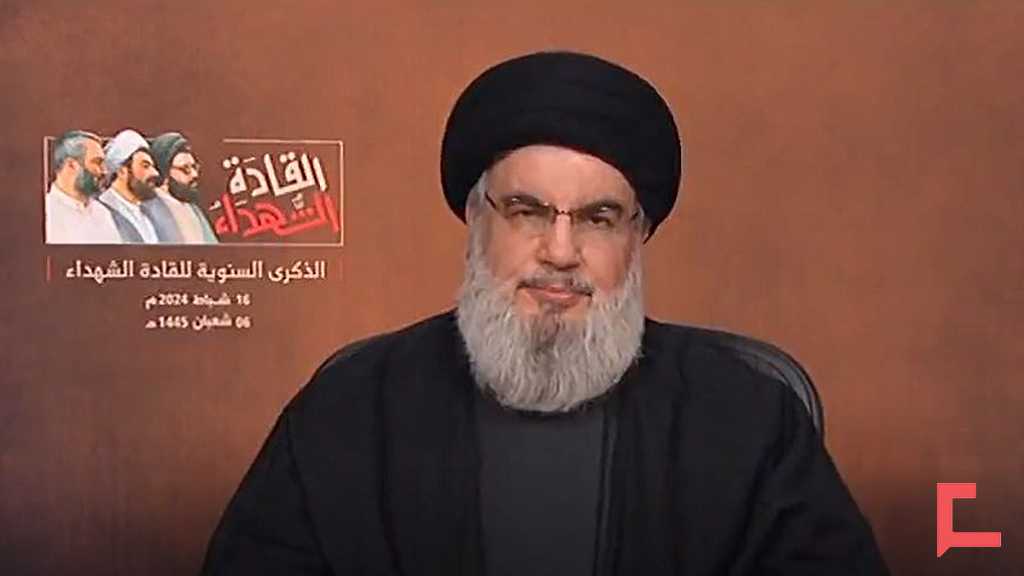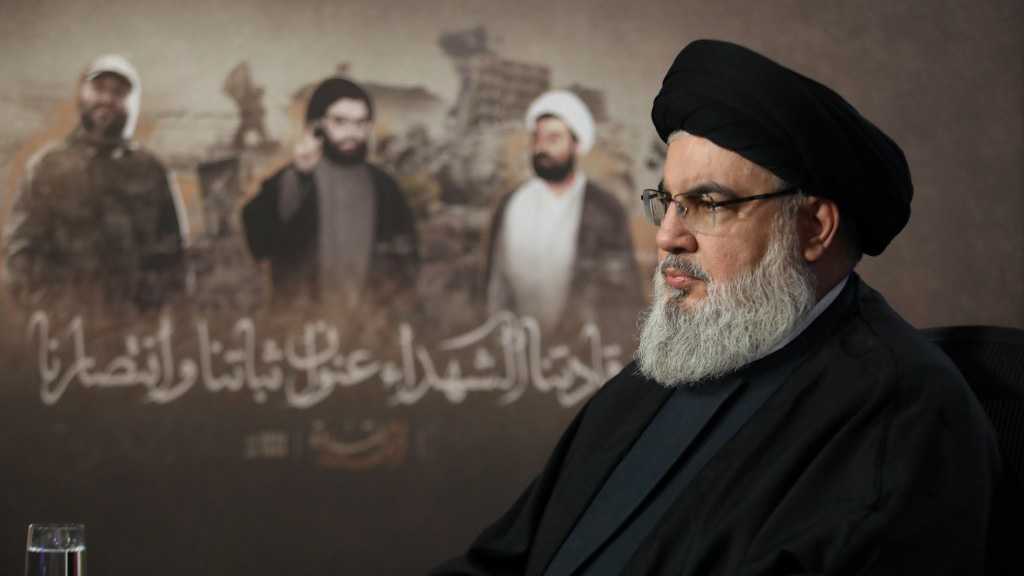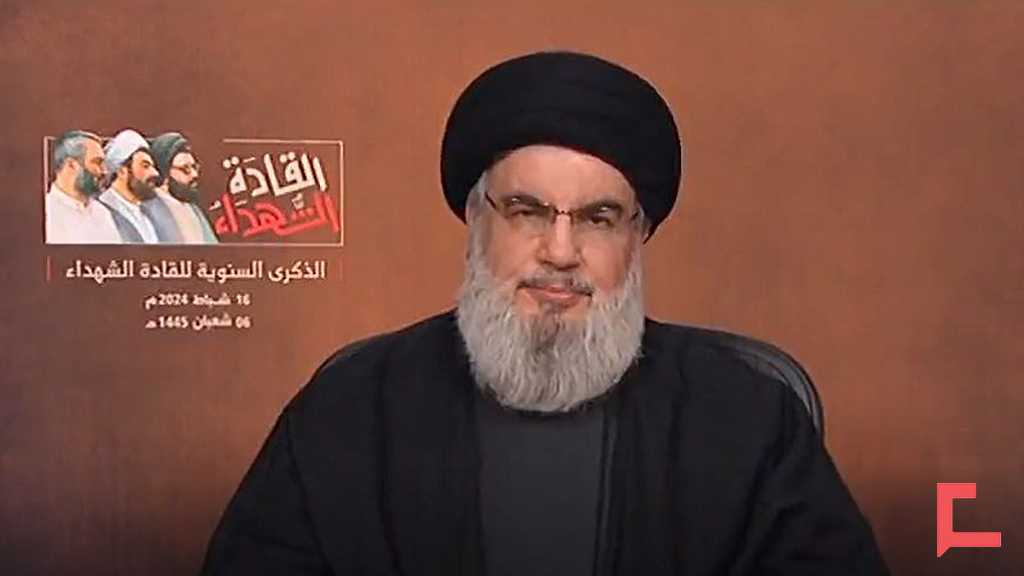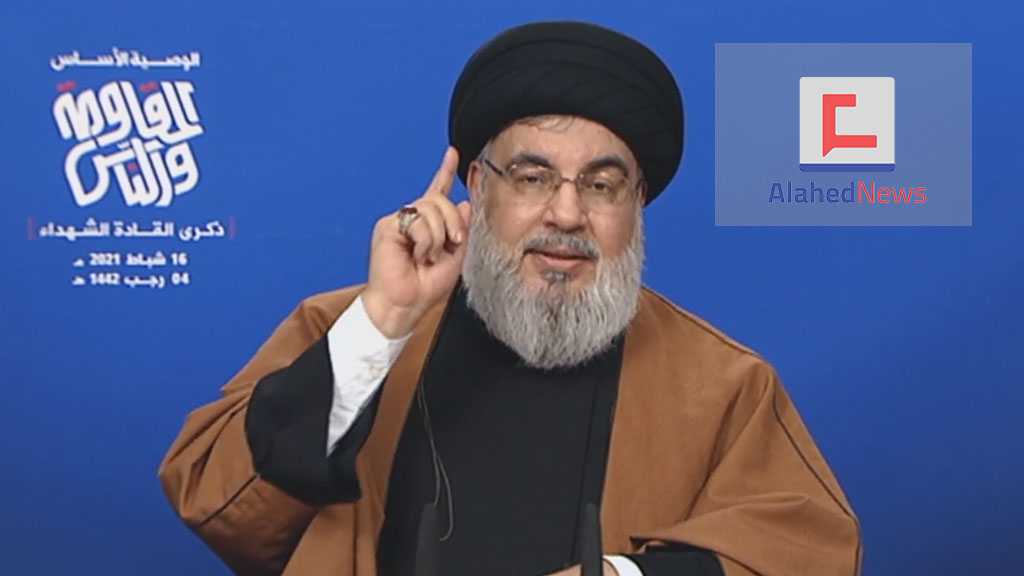
Sheikh Damouch to Al-Ahed: Martyrdom of Leaders Gives the Cause New Impetus
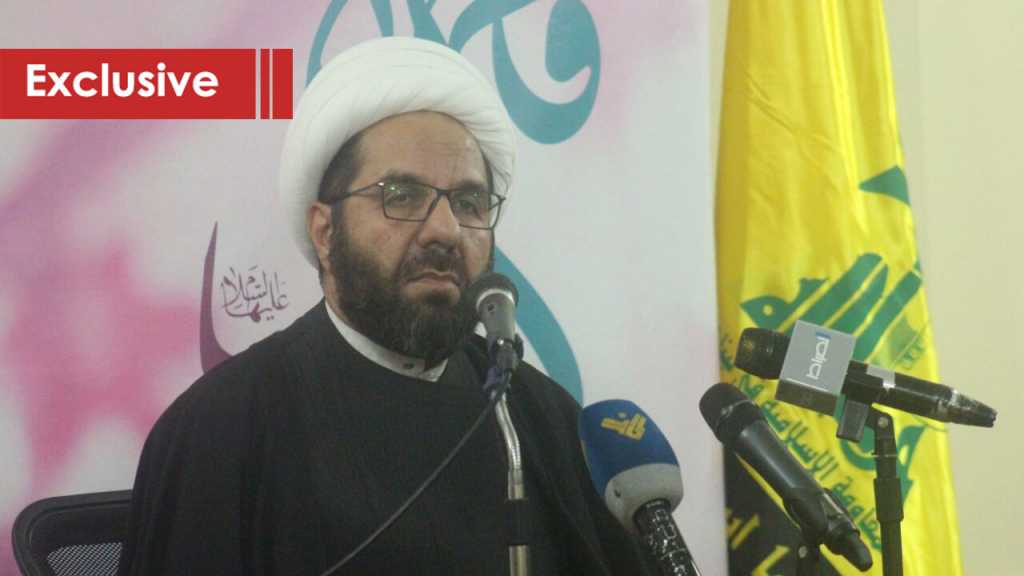
By Fatime Deeb Hamzeh
Sheikh Ali Damouch, vice Chairman of the Hezbollah Executive Council told al-Ahed news that the blood of the martyr (General Qassem) Soleimani has contributed to reviving the revolution.
Beirut - In an interview with al-Ahed news website on the 12th anniversary of the martyr leaders of the Islamic Resistance and the Fortieth day commemoration on the martyrdom of General Soleimani, master of the martyrs of the resistance axis, martyr Abu Mahdi al-Muhandis and their comrades, Sheikh Damouch said that the rallies of millions across the Iranian cities during the memorial of Soleimani reminded us of the days of the revolution. He added that Soleimani’s blood united the Iranian people in face of American hegemony, and established for a total end for any American military presence in the region.
Sheikh Damouch said that the American administration tried to take advantage of the popular movement in Lebanon to change the balance of powers and alter the domestic political equations but it failed and was unable to remove Hezbollah and its allies from the government.
He also noted that the US efforts not only failed to cause any change in the balances created during the latest parliamentary elections, but also its failure allowed the parliamentary majority to form a government in Lebanon far from any US dictates.
He went on to say that the government, and after winning confidence in the parliament faces major challenges on the financial, economic, political, popular, regional and international levels. The government, he pointed out, must start a new phase of hard work and must take immediate and serious action and initiate towards bringing into effect fast and tangible achievements.
- On this occasion, new challenges arise including the deal of the century and the assassination of General Qassem Soleimani as well as Haj Abu Mahdi al-Muhandis, how do you describe the challenges of the current phase?
I think that the US administration, and through the assassination of Soleimani and al-Muhandis as well as declaring the deal of the century, wanted to change the current equation in the region and deliver a severe blow to the axis of resistance, Palestine, al-Quds and the cause of the Palestinian people. Henceforth, the Palestinian people united together with all its components, authority, and factions under the umbrella of confrontation and resistance and rejected the deal. They also declared their adherence to their land as well as their full historical and legitimate rights. Also, the axis of resistance has been advancing in all areas of conflict from in Iran to Iraq, Syria, Yemen and Lebanon.
In Iran, the blood of martyr Soleimani revived the revolution again, and the scenes that we saw with millions joining rallies in various Iranian provinces, reminded us of the days of the revolution. His pure blood united the Iranian people in face of American arrogance, and established for the end of American military presence in the region.
In Iraq, the Iraqi Parliament, with the blessings of the blood of the two martyrs, slapped the Americans when it decided to ask the American and foreign forces to leave Iraq, and when the Iraqi people poured into the streets in millions to expressed their categorical rejection of the American presence in Iraq.
In Syria, the Syrian army and its allies have made great achievements on the Idlib front and the countryside of Aleppo, and progress towards terrorist groups on this front continues with great momentum. Also, the Yemeni army, the people's committees, and Ansarullah have made great progress on the front of Naham and others in the face of the mercenaries of the Saudi-American aggression.
As for Lebanon, the American administration tried to take advantage of the popular movement and carryout a coup against the balance of power, and change the existing internal political equation, but it failed and was unable to remove Hezbollah and its allies from this equation or from the government, and thus was unable to change the balances that were produced by the recent parliamentary elections. Not only that, but also the parliamentarian majority was able to form a government for all Lebanon, away from American dictates and desires. However, the government, and after it gained confidence in the Parliament, faces great financial, economic, political, popular, regional, and international challenges. Before these challenges, the government must start a new phase of serious work and carryout immediate procedures to bring into effect quick and tangible achievements.
It will face great responsibilities, and it must prove its worth and its ability to act, achieve results and succeed in the confidence test, because the benefits and challenges do not bear any sort of delay or procrastination. Hezbollah works besides all those who are keen on developing ideas and searching for feasible solutions to the financial and economic crisis through a specialized committee, in a manner that preserves the sovereignty of our country, and does not lead to additional burdens or new taxes for the people.
- It seems that the leaders and causes of the axis (of resistance) is targeted more than any other time, how will Hezbollah face such a situation?
Targeting the axis (of resistance) by the Americans and Israelis and their allies is not new. It is a continuous path from the beginning and at all levels. It has taken many and varied forms, from the wars launched by America and Israel on the countries of the axis, to assassinations, sanctions, and the instigation of protests, to misguided media campaigns and the use of mobs of takfiri terrorists who sabotage, vandalize and bomb areas in more than one country.
All these challenges were faced by the axis of resistance by persistence and holding onto the path of resistance as well as steadfastness. The resistance will remain to be chief in confronting all new challenges. Nevertheless, after the assassination of the two martyrs, Soleimani and al-Muhandis, the confrontation entered a new phase; the axis of resistance moved from defense stage to attack stage with specific goals including: removing all American military presence from the region.
Targeting the Ein al-Assad base with Iranian missiles was the first blow in the context of a long path that will not stop until achieving this goal, and today all factions in the axis of resistance and the leaders of the resistance movements are determined to work hard to achieve this goal. This is a decisive decision in the axis of resistance in which no slackness will occur, and the confrontation is not only a security and military confrontation, but rather a comprehensive political, media, cultural, economic, security and military confrontation against the American presence in the region.
For instance, the factions of al-Hashd al-Shaabi in Iraq are determined to implement the decision of the Iraqi parliament to remove American forces from Iraq, but they are willing to give the political process and diplomatic effort a specific opportunity to implement this decision and impose withdrawal on the Americans. However, if the American side refrains from withdrawing and does not leave Iraq, then the Iraqi resistance forces will make a move to force the Americans to withdraw soon. This is what the leaders of the Iraqi resistance have announced decisively and unequivocally. It is only a matter of time.
Also today, there is something that seems like an interconnection between the battlefields, and all these fronts must continue to work. The Syrian front must continue to advance firmly towards final victory, as well as the Yemen front and other fronts. All resistance movements must remain attached to their goals, their central cause, and their primary struggle. And to cooperate, coordinate and continue in the effort to maximize its strength and capabilities, to meet all new challenges and achieve its goals.
- What are the materialistic and spiritual dimensions of the military equations that were imposed by the resistance on the enemy?
The resistance established many materialistic, spiritual and cultural equations and additional values in the conscience of its fighters, generations and the nation, including: faith and religious commitment, national commitment, the distinctive ethical behavior of the fighters, sincerity at work, seriousness, perseverance and patience despite difficulties and tragedies, good planning and tight action away from randomness, chaos and excitement, and the constant readiness to sacrifice for the sake of Allah with soul, blood, children and money.
Nonetheless, the foundation remains in the culture of resistance, the logic of resistance, and the spirituality of Jihad that the resistance created in the hearts of the younger generation. This generation which seeks martyrdom for the sake of God, this generation which loves its country, people and nation and wishes them good, freedom, dignity, glory, pride and victory. It is the generation of self-discipline in this world that is always ready to sacrifice, which trusts in God and has faith that God is the one who bestows victory. These are the basic additional values.
The victories and accomplishments achieved by the resistance, the martyrs, and the martyr leaders throughout all the stages were owing to the spirituality that it enjoys and not dependent on weapons, human resources or military equations.
The tenet of all victories was in the culture and in the spirituality of Jihad that was motivating the fighters to storm the Zionist castles and fortresses with all determination and courage. The tenet of the greatest victory is that those who love death defeat those who fear death, and that those who see death and martyrdom as a path to eternal life defeat those who see death as loss; this is the basic equation on which the experience of the resistance, its fighters, martyrs and martyr leaders depend.
- What sort of additional value did the blood of General Soleimani and Haj Abu Mahdi al-Muhandis have on the axis of resistance?
The martyrdom of the great martyrs has great implications and blessings, and its effects are reflected on the path of Jihad and on the spirit and culture of the nation, because the blood of the martyr is not a loss at all, even in the materialistic sense.
Blood brings with it profit, growth, development and blessing. It is true that when the martyrs depart we lose, especially the leaders who are key players, however, the sacrifice and altruism of one martyr creates a sense of altruism and sacrifice in the hearts and minds of hundreds, even thousands of people, and sets an example for them in altruism, sacrifice, strength, effectiveness, and sincerity. Hence, martyrdom is the death of an individual and the birth of a nation.
The martyrdom of great martyrs gives the nation many blessings, establishes new stages and a new future and opens new horizons. This martyrdom gives the cause a new momentum, a rapid push and great development. Martyrdom also pushes towards victory and achievement of accomplishments.
For example, in the Islamic Resistance in Lebanon, the martyrdom of the martyr, Sheikh Ragheb Harb, established a new stage of resistance, which is the stage of revival, breaking the barrier of fear, moving to the armed and popular resistance, and expelling the Zionists from the mountain, Beirut, Sidon, Tyre, and Nabatiyeh in 1985. Then came the martyrdom of the master of the martyrs of the resistance, Sayed Abbas (Mousawi) to give momentum and new impetus to the resistance.
Following the martyrdom of Sayed Abbas, the resistance was on an ascending path and in a deliberate, planned and accurate movement until the great victory in May 2000. Then again, the martyrdom of Hajj Imad Moghniyeh, established for the disappearance of Israel from existence, as expressed in the words of the Secretary General (of Hezbollah) may God protect him.
There is no doubt that the blood of Hajj Qassem Soleimani and Hajj Abu Mahdi al-Muhandis and the martyrs with them gave tremendous momentum to the resistance movements in the region, and in the words of His Eminence the Secretary-General, may God protect him: “their martyrdom is a new birth to the resistance and the axis, to the spirit and culture of the resistance, and even for us as people or many of the resistance youth, cadres, or leaderships in different arenas. Their martyrdom has created a new spirit, new blood, and a great rush, and their blood will put the axis of resistance and the peoples of the region in an open confrontation with the American administration and with the American presence in the region. This is the main worth of the blood of Hajj Qassem and Hajj Abu Mahdi on the spiritual level, resistance axis level and the regional level. Therefore, we are confident that all the resistance factions and resistance movements after the martyrdom of these two leaders will have a stronger drive and will move forward with more determination and great hope on the path of resistance to achieve the same goals, as the resistance in Lebanon, which moved forward with greater determination and more force after the martyrdom of its senior leaders.
Comments
